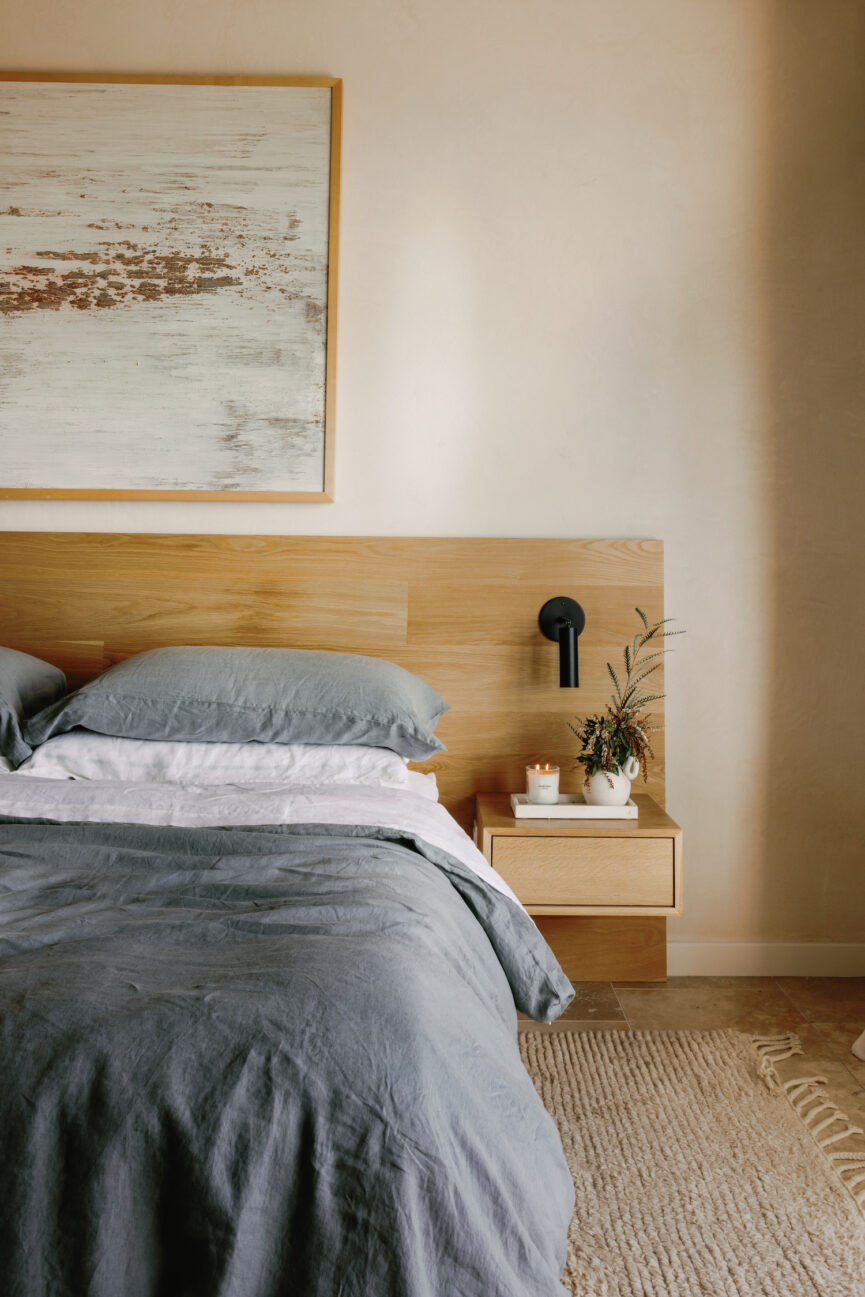So much of adulthood is about relearning the habits your parents tried to teach you as a child (sorry, Mom and Dad!). Slowly, you realize you do feel better after you accomplish the simple things: staying hydrated, eating enough protein, and preparing for the day ahead the night before. Whenever I fall back into the habit of crafting a nighttime routine, it always surprises me how much a productive morning really does start the night before. However, it’s so easy to neglect this habit and wake up feeling like you’re already behind.
That’s why I’ve cultivated a simple but effective nighttime routine that I can actually stick to. Read on to discover how to craft a nighttime routine of intention by creating a soothing environment, setting boundaries, and prioritizing self care.
Featured image by Riley Reed.


The Science of a Night Routine
Our bodies crave routine. Our circadian rhythms sync our sleep-wake cycles to the sun. And, once it gets dark, our bodies naturally produce melatonin, the sleep hormone. That’s why in the winter, when it gets dark sooner, you might feel called to wind down early. But thanks to caffeine and artificial light, our natural sleep cues are often inhibited. Our bodies hate unpredictability — which is why getting out of rhythm often leads to increased cortisol. However, cultivating consistent habits can help your body remember when it’s time to wind down, leading to an easier morning.
And it’s no secret that we at Camille Styles relish our beauty sleep. Creating a nighttime routine isn’t just about making sleep something to look forward to, but also about maximizing your rest so it can have its full effect. Studies show that an impressive 76 percent of people who follow a nighttime routine say their sleep quality was very high. Good sleep compounds over time, leading to improved mood, sharper focus, and overall better health.
Crafting the Perfect Night Routine
Step 1: Start with Intention
Here’s the thing about nighttime routines: they don’t need to be complicated, but they do need to be intentional. If it’s been a while since you’ve had a consistent nighttime schedule, start by asking yourself to define certain goals. Do you want to increase your sleep score on your Oura Ring? Minimize brain fog? Wake up looking refreshed instead of puffy? Creating consistent habits hinges on defining reasons for following through.
Once you’re clear on your goals, the best way to reach them is to break them down into small tasks. Don’t try to do too much too fast—we’ve all promised ourselves that we’ll make drastic changes, then fall short. Instead, identify tiny but significant shifts that will make a difference. This might mean cutting out your afternoon coffee or skipping that late-night scroll. It could mean setting a “wind down” hour before bed, or having dinner a little earlier than usual. Remember, these changes add up.
Step 2: Create a Soothing Environment
The first step to waking up in an energizing environment is making sure your physical space isn’t holding you back. Studies have shown that all those “unfinished projects” and the clutter in your home make you more likely to feel fatigued. So a little decluttering can go a long way. Can’t commit to a nightly deep clean? You don’t have to. I like to set a timer for 15 minutes and just do my best to clear as much as I can in that period. I also use baskets for miscellaneous items during my nightly clean that I can sort through once a week.
Once you have a clean space, you can also make it a more calming using sensory objects. Invigorating all your senses helps give your body more cues to latch onto when it’s time to wind down. Maybe you light a candle two hours before bed. Alternatively, aromatherapy can help you relax while signaling that it’s time to settle into sleep mode. Lighting is also a huge sensory cue—nothing makes you more eager to hop into bed and unwind. I’m not one to leave the big light on, ever. But especially not when it’s time to start my nighttime routine. Instead, I opt for lamps and taper candles.
Step 3: Prioritize Self-Care
If you do one thing for yourself all day, make it a moment of self-care right before you go to sleep. So often, we can neglect our own needs all day, right from the minute we open our eyes. I’m definitely guilty of checking emails right when I wake up, then pulling out my laptop to rush out a task before I’ve even had breakfast. Then suddenly the day is over and I haven’t taken a second to check in with myself.
Self care can be a five minute stretch cycle, a quick journal prompt, or an extra step in your skincare routine before you go to sleep. Anything that’s just for you.
Step 4: Set Boundaries with Technology
My worst habit is getting into bed at a decent hour… then scrolling on my phone until it’s super late (I know I’m not alone). Blue light from screens inhibits natural melatonin production, making it harder to fall asleep. Plus, sleeping near my phone makes it more likely that I will scroll first thing in the morning, which is also common. Being on your phone before you’re fully awake can impact how your brain works all day—and overload you with empty dopamine that makes it harder to transition to other activities throughout the day.
Depending on your intentions, set the boundaries that make sense for you. One big change can be using a real alarm instead of your phone. Or, if you use your phone as an alarm clock, keeping it in another room so that you have to get out of bed to turn it off—jumpstarting your day and resisting the temptation to scroll under the covers. You can also use blue light blockers to keep it from affecting your sleep (if you can’t take a phone break). I also use apps that block my social media starting an hour before my target bedtime.
Step 5: Transition with Mindfulness
Getting the motivation to start a nighttime routine is half the battle. That’s why it’s important to transition mindfully into one.
Easing into your routine can look like starting with the most enjoyable component—like that self-care ritual of stretch session—or introducing calming activities like deep breathing, meditation, or journaling. I personally like to ease into my nighttime routine by reflecting on the day before. Some days, I write down one memorable thing from the day. Looking back at these little things every day adds up.
A Peek into Real-Life Night Routines
Looking into the nighttime routines of admirable women can be another way to get excited about starting (or restarting) this habit. Here are some of my favorite examples of how inspiring women end their days, to give you some ideas:
- Molly Sims: Entrepreneur, Supermodel
- Do a red light therapy mask for 20 minutes right before bed
- Drink a cup of Moon Juice Magnesi-om.
- Clare Vivier: Founder and designer of Clare V
- Nighttime skin routine of Shani Darden products
- Pack for the next day
- Get into bed and read.
- Stella Simona: Founder and creator
- Light a candle, have some tea
- Tidy her bedroom
- Bath and beauty routine
- Tiffany Paul: Founder and podcast host
- Clean up and put the kids down
- Tea or a CBD drink
- Look at tomorrow’s schedule, make a to-do list
- Listen to a podcast
- Evening stretch routine
- Fall asleep with a satin eye mask
A nighttime routine can be whatever you need it to be—it just has to set you up for your definition of success!
Troubleshooting Common Night Routine Obstacles
Let’s be honest: life happens. Kids need attention, work deadlines loom, and sometimes Netflix is just too tempting. Instead of abandoning your routine altogether, consider it a flexible framework. On challenging nights, focus on a few easy essentials—maybe just the kitchen reset and five minutes of stretching. Remember, something is always better than nothing.
If you find yourself tripping over the same obstacles, there might be something deeper to address:
- Staying consistent: If you don’t feel motivated, maybe your routine needs tweaking. What can you add that excites you?
- Balancing family responsibilities: Get your family involved! Make the closing shift a time to go over your day with your partner and tell each other what you’re grateful for while decluttering your space. Get the kids involved in stretching. Journal at the kitchen table as they do their homework. Whatever works!
- Avoiding distractions: Often, low-effort dopamine like technology or TV can impede our search for more nourishing routines. Keep a book by your bedside instead of your phone. Put a gratitude journal where you usually keep your laptop or TV remote. By prompting yourself to make better habits, it’s easier to make them second nature.
How to Stay Consistent and Flexible
There is no “perfect” nighttime routine for everyone. Yours can shift as your intentions change. It can also shift if you realize certain things might sound nice, but don’t really add much to how you feel in the morning.
What matters most is staying consistent. A nighttime routine might feel like an extra obligation, but really, it will keep you productive and support your goals and overall health.
Conclusion: The Ripple Effect of a Good Night Routine
The most surprising thing about establishing a night routine isn’t just better sleep, it’s how it transforms your entire approach to self-care.
Start tonight. Choose one small habit and commit to it for a week. Notice how it feels. Then, gradually add another. Before you know it, you’ll have created an evening routine that not only helps you sleep better but sets the tone for more intentional, peaceful days ahead. Remember, the goal isn’t perfection—it’s progress. Your future self will thank you for starting now, even if you begin with just one small step.






